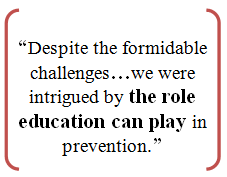Can Mass Atrocities Be Prevented Through Simulation?
Editor’s note: We are pleased to welcome Tucker B. Harding and Mark A. Whitlock, both of Columbia University, whose article “Leveraging Web-Based Environments for Mass Atrocity Prevention” appeared in the Simulation & Gaming February 2013 issue, Symposium: Simulations, games and peace.
 The impetus for this research emerged from a common theory to practice conundrum faced by professors teaching a graduate course on the Prevention of Mass Killing at Columbia University. The authors sought to design a computer based simulation to educate learners on the complexities of preventive action, with a keen focus on the decision making process of various actors ranging from “preventers” to potential perpetrators.
The impetus for this research emerged from a common theory to practice conundrum faced by professors teaching a graduate course on the Prevention of Mass Killing at Columbia University. The authors sought to design a computer based simulation to educate learners on the complexities of preventive action, with a keen focus on the decision making process of various actors ranging from “preventers” to potential perpetrators.
 Taking the simulation from the classroom to the field of practice represented our primary case study and the results challenged several of our foundational assumptions regarding the efficacy of early warning. The African early warning analysts trained with COUNTRY X, and subsequently interviewed, highlighted early warning to early action challenges at their subregional level.
Taking the simulation from the classroom to the field of practice represented our primary case study and the results challenged several of our foundational assumptions regarding the efficacy of early warning. The African early warning analysts trained with COUNTRY X, and subsequently interviewed, highlighted early warning to early action challenges at their subregional level.
These findings have shaped a new set of research questions exploring the psychology and politics of decision making in crisis situations with a specific interest in forecasting and predictive analytics. Building on the lessons from this article, our current research examines early warning, big data and advancements in machine learning to better understand the plausibility of risk reduction in preventive action. This is timely as the phenomenon of big data promises to reshape next-generation conflict prevention mechanisms locally and globally.
Click here to access the article, “Leveraging Web-Based Environments for Mass Atrocity Prevention,” in the latest issue of Simulation & Gaming.
 Tucker B. Harding is a doctoral candidate in Communication and Education at Columbia University, researching the use of educational simulations for improving different kinds of teaching and learning. He also manages small- and large-scale educational technology projects for Columbia’s Center for New Media Teaching and Learning, a group dedicated to enhancing education through the purposeful use of new media and technology.
Tucker B. Harding is a doctoral candidate in Communication and Education at Columbia University, researching the use of educational simulations for improving different kinds of teaching and learning. He also manages small- and large-scale educational technology projects for Columbia’s Center for New Media Teaching and Learning, a group dedicated to enhancing education through the purposeful use of new media and technology.
 Mark A. Whitlock is an adjunct professor in the Negotiation and Conflict Resolution program at Columbia University. His research and practice interests encompass international relations, political identity, crisis early warning, and the prevention of mass atrocities with an emphasis in Africa and the Middle East. He has designed courses at Columbia and New York University on statebuilding, networks, and preventing mass killing.
Mark A. Whitlock is an adjunct professor in the Negotiation and Conflict Resolution program at Columbia University. His research and practice interests encompass international relations, political identity, crisis early warning, and the prevention of mass atrocities with an emphasis in Africa and the Middle East. He has designed courses at Columbia and New York University on statebuilding, networks, and preventing mass killing.

































































































